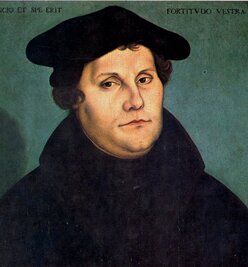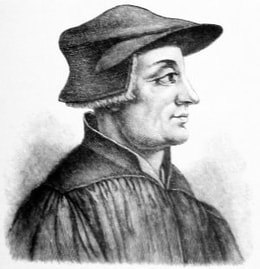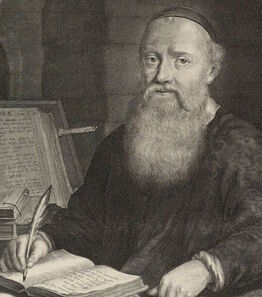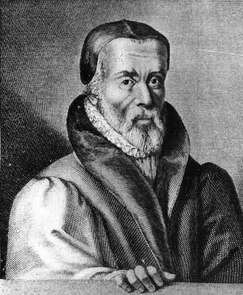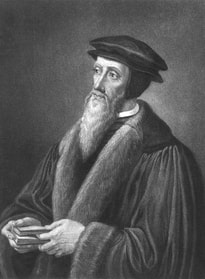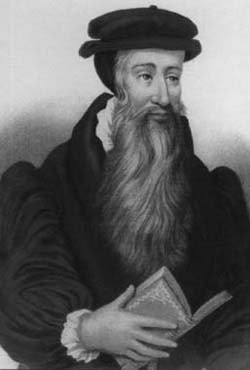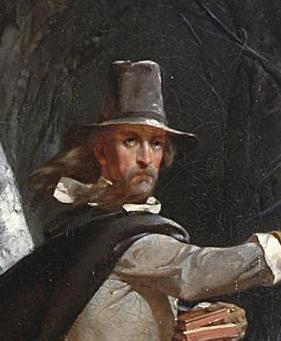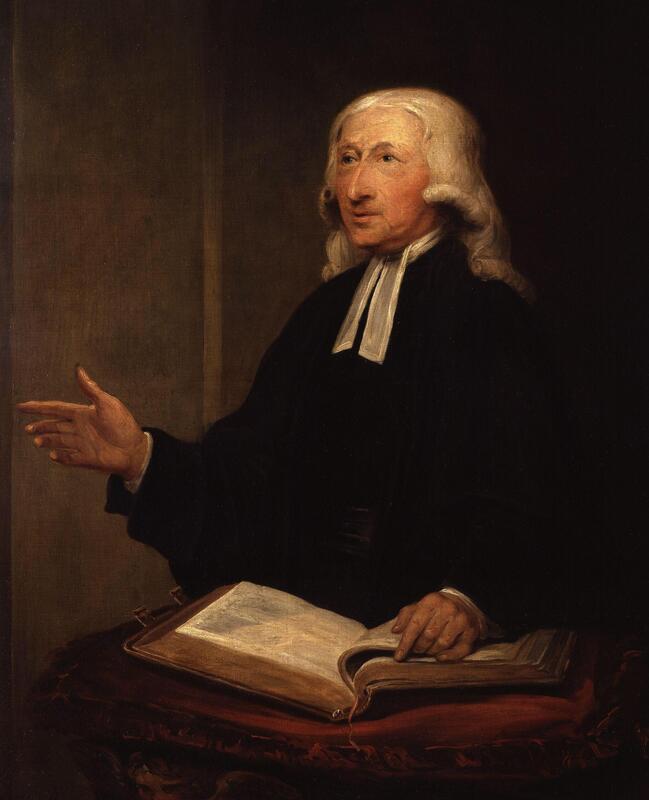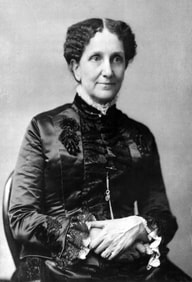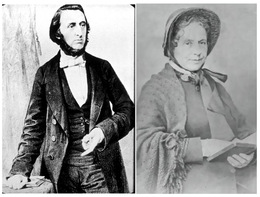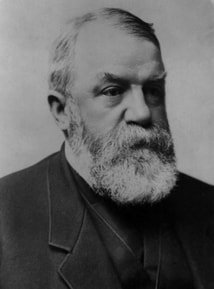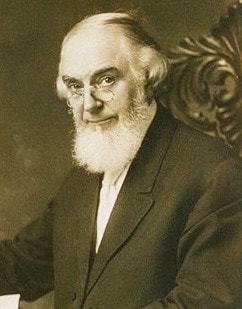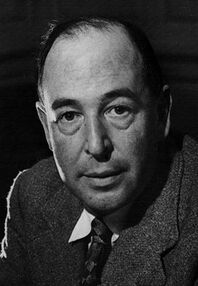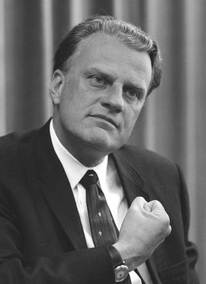|
On October 31, 1517 Martin Luther published 95 criticisms of the Catholic Church practice of selling Indulgences. Although he intended to reform Catholicism, not break it apart, he accomplished both. The 500th anniversary of Luther's act of conscientious defiance in October of 2017 allowed us to review how that moment changed the world religiously, economically, politically, socially, and intellectually. The upheaval stretched into every fabric of society, exceeding anything Martin Luther could anticipate. So widespread of an effect proclaims God's hand was involved.
Between the New Testament era and the 1500s, Roman Catholicism established a monopoly on Christianity in Western Europe. They abused their position. Many of the practices they used seem shocking today, even to Catholics. The celebration of Mass was performed in a language church members did not understand. The text of the Bible was unknown to parishioners. Governments were subject to the Pope. Most of the land was owned by the Catholic Church. Bishops lived with aristocratic privileges while peasants supported the Church under a feudal system that exploited their labor. Critics were tortured and executed. For many of the common “Christians,” it was the traditions, icons, statuary, tapestries, and paintings that defined “Christianity” instead of the words of scripture. The word “Protestant” is based on the root word “protest.” Luther protested Catholic practice, and as a result of widespread abuses by the Catholic Church, a chorus of others joined in to likewise protest against Rome. The protests unleashed against Catholicism quickly spread throughout Europe. Protestantism succeeded because it was needed. Catholicism brought it upon itself by its failure to provide a genuine Christian experience for the common man. At the same time as Luther, Calvin, Knox, Zwingli, Simons, and others began to oppose Catholic abuses, there was an eager audience wishing to be freed from under Catholic domination. |
Reformation fathersMARTIN LUTHER
Luther’s devotion included prolonged prayer, fasting, depriving himself of sleep and inflicting physical discomfort to subject the body to the spirit, and even abusing himself with a whip to attain mastery over the flesh. His personal zeal resulted in a growing chasm between his self-discipline and the institutional indulgence of sin. It is fitting that the great breach between him and the Roman Catholic hierarchy came over the issue of selling Indulgences to profit the church. Indulgences were believed to come from an available storehouse of merited blessings earned by the saints, over which the Roman Catholic Church held discretionary authority because of the keys given to St. Peter. The original practice of conferring an Indulgence required acts of devotion or penitence to merit the grant from the Pope. It was later changed to allow for purchase, independent of any penitence or devoted service. By the time Luther confronted the practice it had grown into a wealth-producing market of selling these rights for the living and their dead ancestors, allowing the wealthy to escape accountability for sinful misconduct by purchasing relief. Luther’s revulsion at the sale of Indulgences provoked his written list of 95 charges against the practice. The 95 Theses were made public on Sunday, October 31, 1517. This event, in hindsight, became the milestone from which the Protestant Reformation is dated. The 500th anniversary of this event was in 2017. The complete listing of Luther's 95 Theses can be found here. Despite the attention given to the 95 Theses, Martin Luther’s greatest contribution to the Protestant Reformation was another project: the translation of the Bible into the common German language, making it possible for laymen to learn the content of scripture. The New Testament was published in 1522 and the complete Bible (including the Apocrypha) in 1534. This was the event that made permanent the fracture between Protestants and Roman Catholicism. Once the language of the Bible could be read by the common man, the false traditions, hypocrisy and violation of Jesus’ teachings were exposed to view. Those who were most religious were unable to reconcile Catholic conduct with the Biblical canon, and soon the Bible was being translated into the commonly spoken languages of Dutch (1526), French (1530), Polish (1563), Spanish (1569), Czech (1549), and English (1526). Like a stone cut out of the mountain without hands, gathering energy and strength as it rolled forward, Martin Luther set events in motion that forever changed the history of Western Civilization. Religious societies multiplied as different bodies placed greater emphasis on different facets of the Bible. Unfortunately, the example of persecution learned over a millennium and a half of Roman Catholic intolerance was not abandoned by the different Christian societies. Most of these daughters of Rome opposed, sanctioned and even violently persecuted those holding different religious views from the locally organized majority faith—thus the Protestants followed the unfortunate example of the church in Rome. The early American colonialists fled to a new continent to escape persecution, but likewise proved to be intolerant of minority religious practices in their new land. By the time of the American Revolution the revolutionary political leaders had centuries of history to draw upon to deal with the question of how to address freedom of religion. The American Constitution, including the First Amendment, is the product of events set in motion by Martin Luther 500 years ago in 2017. The influence of Luther’s life on the world cannot be overstated. He began a revolution that a half-millennium later still affects the world culturally, politically, religiously and educationally. He was far more than merely a religious figure. He is one of the few people who have literally changed the world. ULRICH ZWINGLI
MENNO SIMMONS
There was a dispute about the correct age for baptism following the 1531 execution of Sicke Freerks Snijder, for his rebaptism as an adult. Menno’s search left him discontent with inconsistent answers he found comparing Luther, Bucer, and Bullinger. He resolved to rely on Scripture alone. Upon this decision he became an evangelical preacher. His preaching provoked opposition, then persecution. "The error of the cursed sect of the Anabaptists … would doubtless be and remain extirpated, were it not that a former priest Menno Symons … has misled many simple and innocent people," complained a letter to the regent of the Netherlands in 1541. "To seize and apprehend this man we have offered a large sum of money, but until now with no success. Therefore we have entertained the thought of offering and promising pardon and mercy to a few who have been misled … if they would bring about the imprisonment of the said Menno Symons." Holy Roman Emperor Charles V joined in, and offering 100 gold guilders for Menno's arrest. He successfully avoided arrest. He reacted to his opposition by adopting pacifism, believing that ideas were more powerful than armies. He said, “The regenerated do not go to war, nor engage in strife. They are children of peace who have beat their swords into plowshares and their spears into pruning forks, and know no war.” His preaching changed those who followed them to become likewise pacifist and moderate. Even before leaving Catholicism, he rejected the Catholic teaching of transubstantiation because he detected nothing in the bread and wine he dispensed at Mass to suggest it transformed into Christ’s body and blood. This was a position he did not adopt lightly, and his decision came only after careful examination of the question. "Finally, I got the idea to examine the New Testament diligently. I had not gone very far when I discovered that we were deceived, and my conscience, troubled on account of the aforementioned bread, was quickly relieved." His view on Christian duty can be summarized in his statement: “True evangelical faith, cannot lie dormant, it clothes the naked, it feeds the hungry, it comforts the sorrowful, it shelters the destitute, it serves those that harm it, it binds up that which is wounded, it has become all things to all creatures.” After leaving Catholicism he became an Anabaptist leader. Though many of their preachers were enthusiastic, even fanatical, he exemplified sober, thoughtful Christian life and tried to be a meek follower of Christ. His followers were thought to be dangerous and were persecuted and mistreated. When they endured it well, the authorities came to regard them as both different and non-threatening. He was not the founder, but was the regenerator of the Anabaptist movement. He was their most significant spokesman in the Netherlands during the sixteenth century. Menno provided moderate leadership and prolific writings to unify the nonviolent Dutch Anabaptists. Their peaceful beliefs have made their survival in surrounding, violent societies a cause for admiration. Menno took I Corinthians 3:11 as his motto – “For no one can lay any foundation other than the one already laid, which is Jesus Christ.” He made this a theme for his ministry, and his teachings are therefore defined as Christ-centered. Menno's followers were referred to as Mennonites, a name used to deride them. Later, however, the Swiss Anabaptists who emigrated to America adopted that name. Today there are almost 1.5 million Mennonites in 75 countries. After leaving Catholicism, he married and fathered three children. He died in 1561. WILLIAM TYNDALE
He was inspired by the work of Martin Luther and translated the Bible into English. He concluded, “Christ desires his mysteries to be published abroad as widely as possible. I would that [the Gospels and the epistles of Paul] were translated into all languages, of all Christian people, and that they might be read and known.” Because of opposition to translating the Bible in England, he traveled to the Lutheran city of Worms where he safely completed the work. He used both Hebrew and Greek sources, rather than the popular Latin Bible used by the Catholic Church, which had been translated by Jerome. He described his effort, “"I call God to record against the day we shall appear before our Lord Jesus, that I never altered one syllable of God's Word against my conscience, nor would do this day, if all that is in earth, whether it be honor, pleasure, or riches, might be given me." In his translation he used the word “congregation” rather than “church” for the Greek “ecclesia.” Tyndale’s translation of the word was not only correct, it was revolutionary. Although this small correction may seem insignificant to readers today, at the time it undermined the Roman Catholic claims to be the only true church and therefore the exclusive body meant by the word “church.” Likewise by rendering the Greek word “metanoeo” as “repent” and not as “do penance” the translation challenged the financial interests of the church in the sale of pardons and indulgences. He translated “agape” as “love” instead of “charity” which also had an economic impact on church donations. In each case Tyndale’s translation conveyed the better meaning, but it came with an economic impact on the church, and therefore offended the church. The Bible translation was considered an act of defiance of both English law and the Roman Catholic Church. He was said to have predicted that not many years following his work on the Bible, “I will cause the boy that drives the plow to know more of the Scriptures than” the Catholic clergy. When the New Testament translation made its way to England in 1525 it was condemned by King Henry VIII, Cardinal Wolsey, Sir Thomas More and others. Thomas More called it the work of the “Antichrist.” He was opposed to King Henry VIII’s planned annulment to Catherine of Aragon in order for him to marry Anne Boleyn and published a work condemning it as unscriptural. This made him the King’s enemy. In 1536 Tyndale was convicted of heresy, stripped of the priesthood, strangled to death and his body burned at the stake. Within three years following his execution, however, King Henry VIII decreed that an English translation of the Bible should be available in every Parish for the public to read. Tyndale’s Bible translation was later used to produce The Great Bible for the Church of England two years following his death, and the King James Bible in 1611. The King James Version copies Tyndale in 83% of the language of the New Testament and 76% of the Old Testament. While he lived, in England possession of a copy of his translation resulted in a death sentence for unlicensed possession of scripture in English. He consoled himself and others while he was in prison awaiting trial on heresy by writing, “if God be on our side, what matter maketh it who be against us, be they bishops, cardinals, popes.” Tyndale summarized how to find happiness in everyday life, “There is no work better than to please God; to pour water, to wash dishes, to be a cobbler, or an apostle, all are one; to wash dishes and to preach are all one, as touching the deed, to please God.” JOHN CALVIN
However certain his teachings may seem, he had an underlying humility about his certitude. He said, “A perfect faith is nowhere to be found, so it follows that all of us are partly unbelievers.” Calvin is given credit for five principle doctrines which are viewed as his. These center on the proposition that God has the ability to save every individual upon whom He chooses to show mercy, despite the failure or inability of the object of God’s grace. The principles are: The total depravity of man: This circumstance exists as a consequence of the Fall of Adam, and the result is that every person is a slave to a sinful nature. Therefore men seek their own best interests, and are prone to be not only in a state of rebellion against God, but also disinclined to love God. The extent of this human failure is “total” or as widespread as humanity itself; hence the “total depravity” of mankind. Unconditional election: God chooses whom He will save. His choice is independent of the faith of those saved, and the decision is made from eternity to either extend or withhold saving mercy thereby producing salvation or damnation according to God’s choice. Salvation is through Christ, and God’s wrath is justified toward the damned because of their sins against God. Limited atonement: Christ provided a definite atonement in which He substituted Himself to receive the punishment on behalf of His elect. Christ suffered and died for an intended group of the saved, and the rest are left to be punished for sins. This has been described by Calvinists: “The atonement is sufficient for all and efficient for the elect.” While all could be saved (because Christ’s suffering was sufficient for all) God intends only to save some. Irresistible grace: Saving grace is effectually directed on behalf of those whom God intends to save who are His elect. For those this grace of God overcomes any resistance caused by the Fall of Adam, and secures for the elect saving faith. When God intends to save an individual, that person will be saved. The mechanism for infusing this irresistible grace is the Holy Spirit which cannot be refused by the elect. While preaching the Gospel may be resisted by sinners, the elect cannot resist it. Perseverance of the saints: Those who are the elect or saints cannot frustrate God’s election by allowing their faith to fail. Those who are brought into communion with God will continue to be His elect until the end. Accordingly, those who fall away were never part of the saved elect in the first place. Calvin declared, “We should ask God to increase our hope when it is small, awaken it when it is dormant, confirm it when it is wavering, strengthen it when it is weak, and raise it up when it is overthrown.” Calvin’s statement in opposition to abortion seems as timely now as when he first framed it: “If it seems more horrible to kill a man in his own house, then in a field,...it ought surely to be deemed more atrocious to destroy a fetus in the womb before it has come to light.” JOHN KNOX
Knox joined in a rebellion that resulted in the murder of Cardinal Beaton, resulting in his arrest and exile. While exiled he worked for the Church of England, becoming a chaplain to King Edward VI. The death of Edward put a Catholic on the throne (Mary Tudor) and Knox was forced to resign and leave the country. He moved to Geneva and met John Calvin, then to Frankfurt to head an Anglican refugee congregation. But his teachings were controversial, ending any further participation in the Church of England. He returned to Scotland and led the Protestant Reformation there, which overthrew the reign of Mary of Guise, putting Mary, Queen of Scots on the throne. She allowed him the freedom to lead the Protestants, and he in turn criticized her Catholicism. He chafed under the rule of women and believed a woman had no right to rule over men. He declared, "To promote a woman to bear rule, superiority, dominion, or empire above any realm, nation, or city, is repugnant to nature; contumely to God, a thing most contrary to his revealed will and approved ordinance; and finally, it is the subversion of good order, of all equity and justice." Queen Mary confronted him, and he explained he was as content to live peaceably under her rule as the Apostle Paul had been to live under Nero’s. Queen Mary defended her allegiance to Rome and Knox responded, “Wonder not, Madam, that I call Rome an harlot; for that Church is altogether polluted with all kind of spiritual fornication, as well in doctrine as in manners. Yea, Madam, I offer myself to prove, that the Church of the Jews which crucified Christ Jesus, was not so far degenerate from the ordinances which God gave by Moses and Aaron unto His people, when they manifestly denied the Son of God, as the Church of Rome is declined, and more than five hundred years hath declined, from the purity of that religion which the Apostles taught and planted." Because church and state were involved throughout his life, Knox addressed these subjects with pen and sermon. He said, “Resistance to tyranny is obedience to God.” And, “A man with God is always in the majority.” Also, "Let a thing here be noted, that the prophet of God sometimes may teach treason against kings, and yet neither he nor such as obey the word, spoken in the Lord's name by him, offend God." Knox was fearless and devoutly believed the Bible should be followed, not merely read. He believed it required him to stand up to corrupt church clergy, kings, queens and society. The force of his personal convictions still echo in Protestant thought beyond the Presbyterian Church he is credited with founding. ROGER WILLIAMS
Williams was an abolitionist and organized the first attempt to prohibit slavery in the British American Colonies. He was also an advocate for separation of church from state. His ideas percolated among colonists and led to the First Amendment to the US Constitution. He wrote, "When they have opened a gap in the hedge or wall of separation between the garden of the church and the wilderness of the world, God hath ever broke down the wall itself, removed the candlestick, and made His garden a wilderness, as at this day." His words were echoed by Thomas Jefferson in the letter to the Danbury Baptist Church which repeated the words “wall of separation” between church and state. Jefferson’s Danbury letter has been cited in several US Supreme Court decisions as if it were part of the First Amendment. Williams founded the first place in modern history where citizenship and religion were separate. His society also adopted majoritarian democracy. These ideals took root and directly influenced the American Revolution a century later. His search for pure religion led him to eventually separate from any organized church and, from 1639 onward he waited for Christ to send a new apostle to reestablish an original, pure and authoritative church. He carefully studied religious societies and history and came to the conclusion that every denomination was flawed. Each church was corrupt, though they differed in their flaws and virtues. He was persuaded that Christianity had departed from the truth early in history and had been corrupt ever since. He wrote, “Christianity fell asleep in the bosom of Constantine, and the laps and bosoms of those Emperors who professed the name of Christ.” This sober reflection led to his conviction that freedom of conscience was necessary to allow every soul to search for and accept all truth they could find. He declared, “There is no regularly constituted church of Christ on earth, nor any person qualified to administer any church ordinances; nor can there be until new apostles are sent by the Great Head of the Church for whose coming I am seeking.” Williams thought the British treatment of American Indians was inequitable, and urged the land be purchased from the Indians rather than taken from them. This view caused conflict between him and the colonial authorities. He was convicted in 1635 of sedition and heresy and banished from Salem. Despite his conflict with colonial leaders, he became a trusted friend by several native tribes in New England, even negotiating the end of conflicts between Indians and Rhode Island for nearly forty years. Twice he allowed himself to be taken hostage (1645 and again in 1671) to guarantee the return of an Indian leader summoned to court. Williams has grown in influence over time, with many of his revolutionary ideas becoming commonplace generations later. He helped to create an American society that welcomes diverse religious views and protects freedom of conscience. Although he did not believe the Christian churches preserved the original, he nevertheless practiced Christianity. He summarized what should be done briefly: “the two first principles and foundations of true religion, or worship of the true God in Christ, are repentance from dead works, and faith towards God, before the doctrine of baptism or washing, and the laying on of hands, which contain the ordinances and practices of worship.” JOHN WESLEY
"In the evening, I went very unwillingly to a society in Aldersgate Street, where one was reading Luther's preface to the Epistle to the Romans. About a quarter before nine, while he was describing the change which God works in the heart through faith in Christ, I felt my heart strangely warmed. I felt I did trust in Christ, Christ alone for salvation, and an assurance was given me that he had taken away my sins, even mine, and saved me from the law of sin and death." This was life-changing and created within him the conviction that he had experienced God’s love and would be saved. Persecution of his views began the next year, 1739, and never abated the remainder of his life. Wesley did not accept the predestination teachings of John Calvin, and was criticized and barred from preaching in his mother Anglican Church. He launched a new direction with people meeting in private homes, praying, reading scripture, discussing spiritual concerns, and collecting money for the needy. As fellow-believers grew in numbers they were dismissively labeled “Methodists”—but the term was accepted by them and in time became the accepted name of a new Christian denomination. During his lifetime, Wesley thought Methodists could in good faith remain members of the Anglican Church. Following his death the two separated. Wesley believed in pursuing and attempting Christian perfection in which men and women could live in this world in a state where God’s love “reigned supreme in their hearts” which would reflect godly holiness. Not as an imaginary concept, but as a living reality. Like Luther before him, Wesley recognized the corruption of the professional clergy, and the failure to preach repentance to sinners. He thought himself called to revive dying Christianity with a new voice crying repentance and promising God’s forgiveness to the earnest seeker. He was loyal to both the Bible and prior orthodox Christian traditions. He believed every soul could be saved by faith in Christ and rejected the idea some were elected by God to salvation while others were doomed to damnation, as Calvin had taught. Salvation by grace could be experienced and known, as he explained: "an inward impression on the soul of believers, whereby the Spirit of God directly testifies to their spirit that they are the children of God." This made salvation personal to each individual. He explained his fear: "My fear is not that our great movement, known as the Methodists, will eventually cease to exist or one day die from the earth. My fear is that our people will become content to live without the fire, the power, the excitement, the supernatural element that makes us great." He acknowledged the decline of the Gifts of the Spirit recorded in the New Testament and noted they disappeared early in Christian history, once Constantine issued the Edict of Milan decriminalizing Christianity (313 a.d.). This led in turn to Christianity becoming the state religion of Rome in 380 a.d. In Wesley’s sermon The More Excellent Way he explained, "The cause of this [decline of spiritual gifts following Constantine] was not, (as has been vulgarly supposed,) `because there was no more occasion for them,' because all the world was become Christians. This is a miserable mistake; not a twentieth part of it was then nominally Christian. The real cause was, `the love of many,' almost of all Christians, so called, was `waxed cold.' The Christians had no more of the Spirit of Christ than the other Heathens. The Son of Man, when he came to examine his Church, could hardly `find faith upon earth.' This was the real cause why the extraordinary gifts of the Holy Ghost were no longer to be found in the Christian Church; because the Christians were turned Heathens again, and had only a dead form left." Wesley’s teachings have influenced Christian thinking far beyond the bounds of the Methodist Church. He is a widely respected and studied Christian thinker. He is credited with posing the question, “"Though we cannot think alike may we not love alike?" His dying words were "The best of all is, God is with us" which he repeated twice. |
When it began the movement was caused by the abuses of the Roman Catholic hierarchy. Reformers shared a common experience that included a conviction that Catholicism was different from New Testament Christianity and failed to either practice or preach Christ's Gospel. The first Reformers also experienced first-hand abusive treatment by local Catholic leaders and sincerely wanted to practice a more pure form of Christianity. In their search to connect with God, they broke from Rome.
consequences of the reformation
The Roman Catholic Church was changed by the Protestant Reformation. They responded, beginning in 1545, with the Counter-Reformation. The Council of Trent convened in 25 sessions between 1545 and 1563 to address needed church reform. In addition to condemning Protestantism, the council clarified Roman Catholic doctrine, reformed church administration, abolished some abuses affecting the sale of indulgences, established more rigorous clergy education and residential rules, affirmed that the Catholic Church was the ultimate arbiter of the meaning of scripture, and explained the relationship of faith and works to counter Luther’s doctrine of salvation by faith alone. It also reaffirmed many practices the Reformers found offensive, including veneration of saints and relics, pilgrimages, indulgences, and veneration of the Virgin Mary. The Counter-Reformation lasted until the close of the Thirty Years’ War in 1648 and addressed reconfiguring the church’s structure, establishing religious orders as well as responding to spiritual movements and political reforms.
Between the Reformation outside Catholicism and the Counter-Reformation within, the Protestant movement reshaped Christianity. In turn, Christianity was revitalized and held far greater relevance to the lives of the common man. Whereas before mere superstition informed most “Christian” beliefs, afterwards Christians were expected to understand, even debate, the meaning of Christ’s teachings. Once the Protestant leaders translated and published the Bible in the language of the common man, an aloof and educated clergy lost their monopoly over access and the right to interpret scripture. Every soul was entitled and expected to read the Bible for themselves.
Society in Europe was transformed in the wake of the Protestant Reformation. The transformation spread to the New World, and North America was initially populated by fleeing Protestants. The government of the United States reflected Protestant values. The American political example, in turn, changed European rule. In time the entire world was influenced, directly or indirectly, by the changes that began with the Protestant Reformation.
As the Reformation gathered strength, Protestant Christianity itself began to fracture. Once the Bible became available in the common languages of Europe, the widespread recognition that other institutions, in addition to Catholicism, failed to value different New Testament teachings led to multiplying denominations.
Although the Reformation of Christianity began a half-millennium ago, it has not completed its destiny. In the New World, Roger Williams reached the conclusion that the original could not be "reformed" back into its original state, but it would require a "restoration" which Christ alone could accomplish. He thought Christ would eventually send another apostle to restore the ancient, original church.
Between the Reformation outside Catholicism and the Counter-Reformation within, the Protestant movement reshaped Christianity. In turn, Christianity was revitalized and held far greater relevance to the lives of the common man. Whereas before mere superstition informed most “Christian” beliefs, afterwards Christians were expected to understand, even debate, the meaning of Christ’s teachings. Once the Protestant leaders translated and published the Bible in the language of the common man, an aloof and educated clergy lost their monopoly over access and the right to interpret scripture. Every soul was entitled and expected to read the Bible for themselves.
Society in Europe was transformed in the wake of the Protestant Reformation. The transformation spread to the New World, and North America was initially populated by fleeing Protestants. The government of the United States reflected Protestant values. The American political example, in turn, changed European rule. In time the entire world was influenced, directly or indirectly, by the changes that began with the Protestant Reformation.
As the Reformation gathered strength, Protestant Christianity itself began to fracture. Once the Bible became available in the common languages of Europe, the widespread recognition that other institutions, in addition to Catholicism, failed to value different New Testament teachings led to multiplying denominations.
Although the Reformation of Christianity began a half-millennium ago, it has not completed its destiny. In the New World, Roger Williams reached the conclusion that the original could not be "reformed" back into its original state, but it would require a "restoration" which Christ alone could accomplish. He thought Christ would eventually send another apostle to restore the ancient, original church.
Protestant christiansMARY BAKER EDDY
She was born in New Hampshire, raised in a religious Congregational family. While still young she rejected the Calvinist principle of predestination, and sought guidance through prayer and Bible study. She married in 1843 and was widowed the following June when six months pregnant. This resulted in her return to her parent’s home. She married a second time in 1853, but it was an unhappy relationship and he abandoned her in 1866 and they divorced in 1873 on the grounds of desertion. She had health problems all her life. Chronic illness and personal losses made her preoccupied with health issues. The physicians of her day administered remedies which caused additional suffering with limited, if any, meaningful relief. She studied homeopathy and investigated a variety of new approaches to medical care. She subjected herself to new “cures” to see if things ranging from hydropathy to placebos, even mental suggestions (hypnosis) would help. While doing so she continued to study the Bible. She sustained a serious injury in 1866 from a fall, and while convalescing and studying her Bible she read about a miraculous healing, and found it suddenly likewise healed her. This was when she discovered Christian Science. After nine years of study, she published her Science and Health with Keys to the Scripture to attempt to set out the principle of Christian healing. She believed Jesus performed healing using a natural, and repeatable, system. She explained, “During twenty years prior to my discovery I had been trying to trace all physical effects to a mental cause; and in the latter part of 1866 I gained the scientific certainty that all causation was Mind, and every effect a mental phenomenon.” Her system was eventually widely taught and hundreds of men and women established successful healing practices based on her work. When other denominations refused to welcome her system, she obtained a charter for the Church of Christ, Scientist in 1879 “to commemorate the word and works of our Master, which should reinstate primitive Christianity and its lost element of healing.” While she did not want to start a church, rejection of the things she believed to be true led her to this inevitability. Her organization is local, that is congregationally organized and democratically run by the participants. She advocated practical steps to improve mankind: “Sin makes its own hell, and goodness its own heaven.” “True prayer is not asking God for love; it is learning to love, and to include all mankind in one affection.” She is regarded as one of the 100 Most Influential Americans of All Time. WILLIAM & CATHERINE BOOTH
William became a Christian at 15, and his potential as a preacher became noticed while he was yet a teenager. His passion to help the down-and-out brought him into the streets, where the people who needed most to find hope in Christ were to be found. He later became a traveling Methodist evangelist, but returned to the streets as his primary ministry. His exposure to poverty and his experience on the streets of London’s slums led him to found The Salvation Army. Catherine was born in Ashbourne, Derbyshire. She was a thoughtful child from a strong Christian family. She is said to have read the Bible cover to cover eight times by the time she was 12 years old. When 14 years old she became seriously ill and spent a lengthy time convalescing and reflecting on her beliefs, including the problems alcohol caused society. This would foreshadow her later work to address the problem. William and Catherine met when he came to preach at her Methodist church. She began to help him in his ministry and, following a three year engagement, they were married in a simple ceremony. Even on their honeymoon William continued to preach because they both believed it was important to be used by God. They had eight children, and adopted a ninth. Seven of their children became well known preachers, all of whom also published hymns. William led the fight against prostitution in London, which involved 13 to 16 year old girls who became trapped in the trade while seeking relief from poverty and hunger. His campaign resulted in legislation against “white slavery.” The Salvation Army led to the formation of the USO, which operates 3,000 service units for people serving in the armed forces. Catherine’s concern about the ill effects of alcohol led to development of The Salvation Army’s alcohol rehabilitation program, which has now helped people for 100 years. The focus of The Salvation Army from the very beginning has been to help the poor, the homeless, the hungry and the destitute. William and Catherine took their mission to the streets, and met the needs where the needs existed rather than remaining in a pulpit to minister to a traditional congregation. He once asked her, referring to the streets of London, “Where can you go and find such heathen as these, and where is there so great a need for your labours?” William Booth took the fight for Christian belief to those who most needed hope. He said, “While women weep, as they do now, I'll fight; while little children go hungry, as they do now, I'll fight; while men go to prison, in and out, in and out, as they do now, I'll fight; while there is a drunkard left, while there is a poor lost girl upon the streets, while there remains one dark soul without the light of God, I'll fight-I'll fight to the very end!" William Booth cautioned us about the trends he saw in both society and religion: “I consider that the chief dangers which confront the coming century will be religion without the Holy Ghost; Christianity without Christ; forgiveness without repentance; salvation without regeneration; politics without God; and Heaven without Hell.” In 1860 Catherine began to also preach publicly and, by her success, she changed her husband’s view about the potential of women ministers. The Salvation Army would become an advocate of sexual equality in the ministry, leaving a legacy of an expanded role for women in churches far beyond The Salvation Army. She was an agent for social reform, and advocated better conditions and pay for women. She is remembered by the Salvationists as “The Army Mother.” DWIGHT LYMAN MOODY
He refused to fight in the US Civil War, claiming that with respect to war he “was a Quaker”—meaning a pacifist. Nevertheless he worked to evangelize Union troops. By 1861 his missionary activities were so successful that he withdrew from business to devote himself full time to missionary work. In 1870 he partnered with Ira Sankey, and the two spent years touring in evangelistic campaigns in the United States and Great Britain. He believed that music would be an effective tool as part of preaching, and recruited Sankey to join him and sing hymns to the crowds. Their selection of hymns became popular and widely used and generated over a million dollars in royalties. It is estimated that more than 100 million people attended the Moody-Sankey revival meetings. He became convinced there was a need to train other evangelists, both men and women. In 1879 he established the Northfield Seminary for girls, and in 1881 Mount Hermon School for boys. In 1886 he founded the Bible-Work Institute of the Chicago Evangelization Society, later renamed the Moody Bible Institute. The royalties from his successful hymnal were used to fund these projects. He believed in being Christian above every other thing in life. He taught, “Christians should live in the world, but not be filled with it. A ship lives in the water; but if the water gets into the ship, she goes to the bottom. So Christians may live in the world; but if the world gets into them, they sink.” He could put a profound sermon in a single quip: “Moses spent forty years thinking he was somebody; forty years learning he was nobody; and forty years discovering what God can do with a nobody.” He lived his life trying to be an example of Christian faith, and taught those who heard him to do likewise. He admonished Christians, “Out of 100 men, one will read the Bible, the other 99 will read the Christian.” Also, “The world does not understand theology or dogma, but it understands love and sympathy.” He believed in the Calvinist tradition. His sermons were filled with insightful quips, personal allusions and penetrating insights. His limited education did not control his destiny, and he had a formidable command of the English Bible text. He could be blunt, and had little pretense in his demeanor. Although he was praised and respected, he never seemed to fall under its control. He stressed God’s love and mercy rather than God’s anger and the risk of hellfire. CHARLES TAZE RUSSELL
He published a six-volume study of the Bible between 1886 and 1904 titled Studies in the Scriptures sold over 19,900,000 copies while he was still living. Always a prolific writer, in 1912 he was responsible for distribution of 35,520,475 free pamphlets, magazines and tracts. His sermons were published in newspapers across America. His last major project was a motion picture project titled Photo Drama of Creation, released in 1914. It was in four parts, two hours per part, dealing with the earth’s history. Although a gifted preacher, Russell claimed no special revelation or vision, nor did he claim any special authority to justify his calling. He did not intend to create a new denomination, but rather to gather Christian believers together. Reason alone was sufficient to figure out what the Bible taught. His early religious exposure made him fearful of eternal punishment while still a teen. He was unable to reconcile this with the love of God, and for a time became a skeptic. By 1870 he concluded that the Bible may be correct, but the competing denominations of Christianity were the culprit in causing believers to err. He wrote, “The various creeds continually conflict and clash; and as each claims a Bible basis, the confusion of thought, and evident discord, are charged to God’s word.” After concluding that the Bible was reliable and the various denominations were misrepresenting its content, he decided there was no religious organization that could be identified as the “true church.” He believed there had been an early apostasy from the truth, writing, “the predicted ‘falling away’ had begun to work even in the Apostolic times.” He taught that the Dark Ages were caused by the neglect of truth and the strife of sectarianism. Despite this, he did not attempt to reorganize the “true church.” Despite his dislike of denominational Christianity, he thought Martin Luther, John Wycliff, John Knox and other Protestant fathers were bold defenders of God’s words. Apart from this, he regarded clergy generally as weak, ineffective and errant. Russell searched the Bible for types and he thought 1813 b.c. until 70 a.d. to be parallel to 33 a.d. until 1915 a.d., using his reason as guide to interpreting the Bible. He believed the World’s Parliament of Religions held in 1893 in Chicago was an example of Christians compromising the purity of their beliefs. He believed simplicity was the primary basis for early Christian worship in the Apostolic age. Jehovah’s Witnesses have described his ministry in these words: “Among that group of sincere Bible students was a man named Charles Taze Russell. While Russell took the lead in the Bible education work at that time and was the first editor of The Watchtower, he was not the founder of a new religion. The goal of Russell and the other Bible Students, as the group was then known, was to promote the teachings of Jesus Christ and to follow the practices of the first-century Christian congregation. Since Jesus is the Founder of Christianity, we view him as the founder of our organization.” Russell explained, “If it is not proper to unite with any of the present nominal churches, would it not be well to form a visible association of our own? Yes, that is what we have—a society modeled after that of the early church. We think we have come back to primitive simplicity.” In many respects Russell was responding to widespread recognition, shared by many of the leaders of the Protestant movement, that Christianity was deeply flawed and needed to be reconsidered. Christianity once held great power to save souls, and descended into squabbling factions. He sought to return to an original simplicity to avoid conflict. C.S. LEWIS
He wrote The Pilgrim’s Regress: An Allegorical Apology for Christianity, Reason and Romanticism in 1933 as his first Christian apology, and went on to write 25 Christian books that sold millions of copies. Many people associate him with the Chronicles of Narnia, an allegorical Christian series of seven books which has sold over 100 million copies and been made into three major motion pictures. He was a friend of JRR Tolkien. His theological contribution in The Great Divorce (1946) and Miracles (1947) are respected by many theologians and general readers. His book, Mere Christianity, was adapted from a series of radio broadcasts from 1942 to 1944. His writings have enduring appeal. Because he has been one of the most quoted Christian writers since he began his role as a Christian apologist, below are quotes from Lewis’ writings to allow him to speak for himself: "Since it is so likely that children will meet cruel enemies, let them at least have heard of brave knights and heroic courage.” On Stories: And Other Essays on Literature. “Each day we are becoming a creature of splendid glory or one of unthinkable horror.” Mere Christianity. “There are only two kinds of people: those who say to God, ‘Thy will be done,’ and those to whom God says, ‘All right, then, have it your way.’ The Great Divorce. “No man knows how bad he is till he has tried very hard to be good.” Mere Christianity. "The sun looks down on nothing half so good as a household laughing together over a meal." The Weight of Glory. “The instrument through which you see God is your whole self. And if a man's self is not kept clean and bright, his glimpse of God will be blurred.” Mere Christianity. “A man can no more diminish God's glory by refusing to worship Him than a lunatic can put out the sun by scribbling the word 'darkness' on the walls of his cell.” The Problem of Pain. "In our own case we accept excuses too easily; in other people's, we do not accept them easily enough." The Weight of Glory. "If God forgives us we must forgive ourselves otherwise its like setting up ourselves as a higher tribunal than him." Collected Letters of C. S. Lewis. "Of all the bad men, religious bad men are the worst." Reflections on the Psalms. "One road leads home and a thousand roads lead into the wilderness." The Pilgrim’s Regress. "Christianity, if false, is of no importance and, if true, is of infinite importance. The one thing it cannot be is moderately important." God In The Dock. BILLY GRAHAM
Graham was widely recognized and a popular Evangelical minister who has been one of the “most admired men” in America for 55 years. He would end Crusades with an invitation for any who felt convicted and wanted to “accept Jesus Christ as your personal savior” to publicly come forward. Thousands responded to his invitation. Graham was an adviser to several US Presidents, including Dwight Eisenhower, Lyndon Johnson and Richard Nixon, and has met with many Presidents from Harry Truman to Barack Obama. He was friends with Martin Luther King, and once paid for his bail to free him in 1963 after his arrest for participation in a Civil Rights demonstration. King and Graham preached together on several occasions, at Graham’s invitation. He founded the Billy Graham Evangelistic Association in 1950, originally headquartered in Minneapolis, but which relocated to Charlotte, North Carolina in 1999. It is still active and publishes Decision magazine as its official publication, and Christianity Today, which is “a global media ministry.” Graham was regarded as America’s Protestant patriarch, providing a Christian conscience to the nation. He also organized and supported evangelism worldwide. He supported training conferences to increase the evangelical presence in many nations. Graham refused to join Jerry Fallwell’s Moral Majority in 1979, explaining, “I’m for morality, but morality goes beyond sex to human freedom and social justice. …We have to stand in the middle in order to preach to all people, right and left.” Graham’s views about seeking salvation for all people everywhere motivated his worldwide ministerial efforts. He summarized his belief in a 1997 interview, “I think that everybody that loves or knows Christ, whether they are conscious of it or not, they are members of the body of Christ... [God] is calling people out of the world for his name, whether they come from the Muslim world, or the Buddhist world or the non-believing world, they are members of the Body of Christ because they have been called by God. They may not know the name of Jesus but they know in their hearts that they need something they do not have, and they turn to the only light they have, and I think that they are saved and they are going to be with us in heaven.” Though still living, Graham has suffered from Parkinson’s disease since 1992 which led to his retirement because of failing health. 2/21/2018 Addendum following the death of Billy Graham: America and the world has lost an Evangelical giant with the passing of Billy Graham. He has been seen and heard both in person and through radio and television by more people than any other Evangelical minister in history. He lived just short of a century. Many pastors, bishops, priests and other leaders of different faiths had theological differences with Billy Graham, but there were almost none who disputed his greatness. He preached a message of salvation by acceptance and confession of Jesus as Savior. His beliefs were grounded in the writings of the Apostle Paul, and echoed much of what Martin Luther believed about salvation. There are millions of people living today whose confidence in salvation through Jesus Christ is based on the preaching of Billy Graham. He inspired not only believers, but also other Evangelical ministers and writers. Today is not a day to mourn his passing, but to respect and appreciate his life's work. |
Today, Christianity is a fragmented, quarreling, and inconsistent patchwork of denominational sects, many of which claim that they alone offer the truest form of Christianity. There have been many Christian thinkers who longed to see Christianity drop its internal disputes and find common ground: C.S. Lewis, Billy Graham, Charles Russell, and many others have made attempts to help Christianity find common agreement. |
One of Christianity’s greatest impediments to unity is the competing economic interests of the various denominations. Today there are preachers, bishops, elders, and ministers who claim that their version of Christianity is the only one that has the power to save, while all others teach false doctrine, are a cult, or are inspired of the Devil. This “dangling carrot” of salvation keeps congregants loyal to their churches’ authority and willing to financially support their professional clergy. In the 500th year of Protestantism the time has perhaps finally arrived when once again the common man can see through the conflicting claims and again protest against the denominational conflicts for what they are: competing economic structures. There is little difference between what motivated the Catholic abuses in the 1500s and the conflicts between denominations today. What Christianity needs is to practice more of what Christ taught and less of what the theological schools have overlaid in order to rebrand their version as “true.” Ministers should not be paid. Tithes and offerings should help the poor. If there were no financial incentive to advance denominational conflicts, they would die out.

